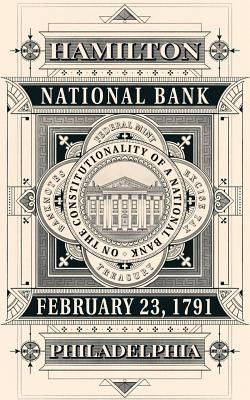
- We will send in 10–14 business days.
- Author: Alexander Hamilton
- Publisher: Coventry House Publishing
- Year: 2016
- Pages: 68
- ISBN-10: 0997952733
- ISBN-13: 9780997952735
- Format: 12.7 x 20.3 x 0.4 cm, minkšti viršeliai
- Language: English
- SAVE -10% with code: EXTRA
On the Constitutionality of a National Bank (Annotated) (e-book) (used book) | bookbook.eu
Reviews
Description
In 1791, The First Bank of the United States was a financial innovation proposed and supported by Alexander Hamilton, the first Secretary of the Treasury. Establishment of the bank was part of a three-part expansion of federal fiscal and monetary power, along with a federal mint and excise taxes. Hamilton believed that a national bank was necessary to stabilize and improve the nation's credit, and to improve financial order, clarity, and precedence of the United States government under the newly enacted Constitution.
Alexander Hamilton (1755-1804) was a founding father of the United States, one of the most influential interpreters and promoters of the Constitution, the founder of the American financial system, and the founder of the Federalist Party. As the first Secretary of the Treasury, Hamilton was the primary author of the economic policies for George Washington's administration. Hamilton took the lead in the funding of the states' debts by the federal government, the establishment of a national bank, and forming friendly trade relations with Britain.
Hamilton led the Federalist Party, created largely in support of his views; he was opposed by the Democratic Republican Party, led by Thomas Jefferson and James Madison, which despised Britain and feared that Hamilton's policies of a strong central government would weaken the American commitment to Republicanism.
- Author: Alexander Hamilton
- Publisher: Coventry House Publishing
- Year: 2016
- Pages: 68
- ISBN-10: 0997952733
- ISBN-13: 9780997952735
- Format: 12.7 x 20.3 x 0.4 cm, minkšti viršeliai
- Language: English English
In 1791, The First Bank of the United States was a financial innovation proposed and supported by Alexander Hamilton, the first Secretary of the Treasury. Establishment of the bank was part of a three-part expansion of federal fiscal and monetary power, along with a federal mint and excise taxes. Hamilton believed that a national bank was necessary to stabilize and improve the nation's credit, and to improve financial order, clarity, and precedence of the United States government under the newly enacted Constitution.
Alexander Hamilton (1755-1804) was a founding father of the United States, one of the most influential interpreters and promoters of the Constitution, the founder of the American financial system, and the founder of the Federalist Party. As the first Secretary of the Treasury, Hamilton was the primary author of the economic policies for George Washington's administration. Hamilton took the lead in the funding of the states' debts by the federal government, the establishment of a national bank, and forming friendly trade relations with Britain.
Hamilton led the Federalist Party, created largely in support of his views; he was opposed by the Democratic Republican Party, led by Thomas Jefferson and James Madison, which despised Britain and feared that Hamilton's policies of a strong central government would weaken the American commitment to Republicanism.


Reviews